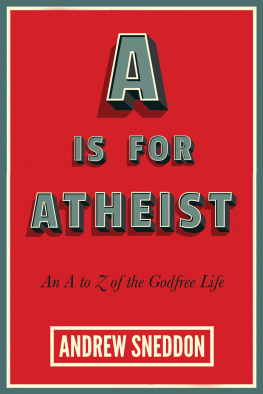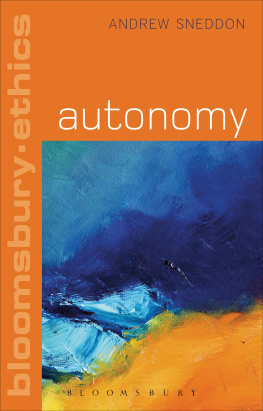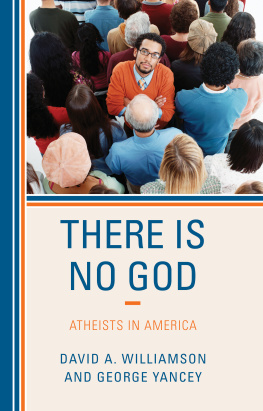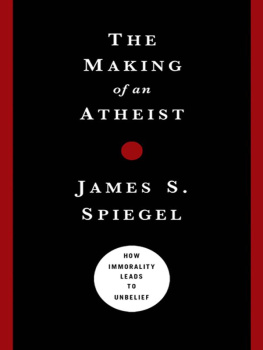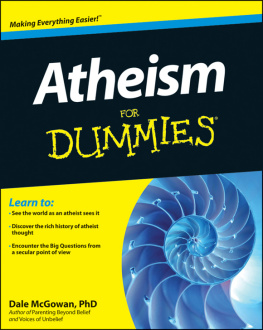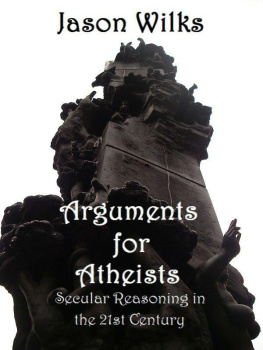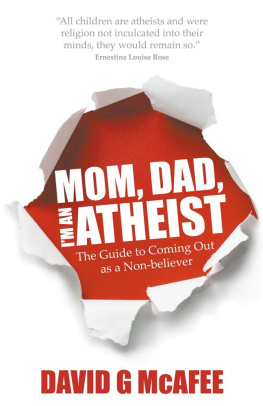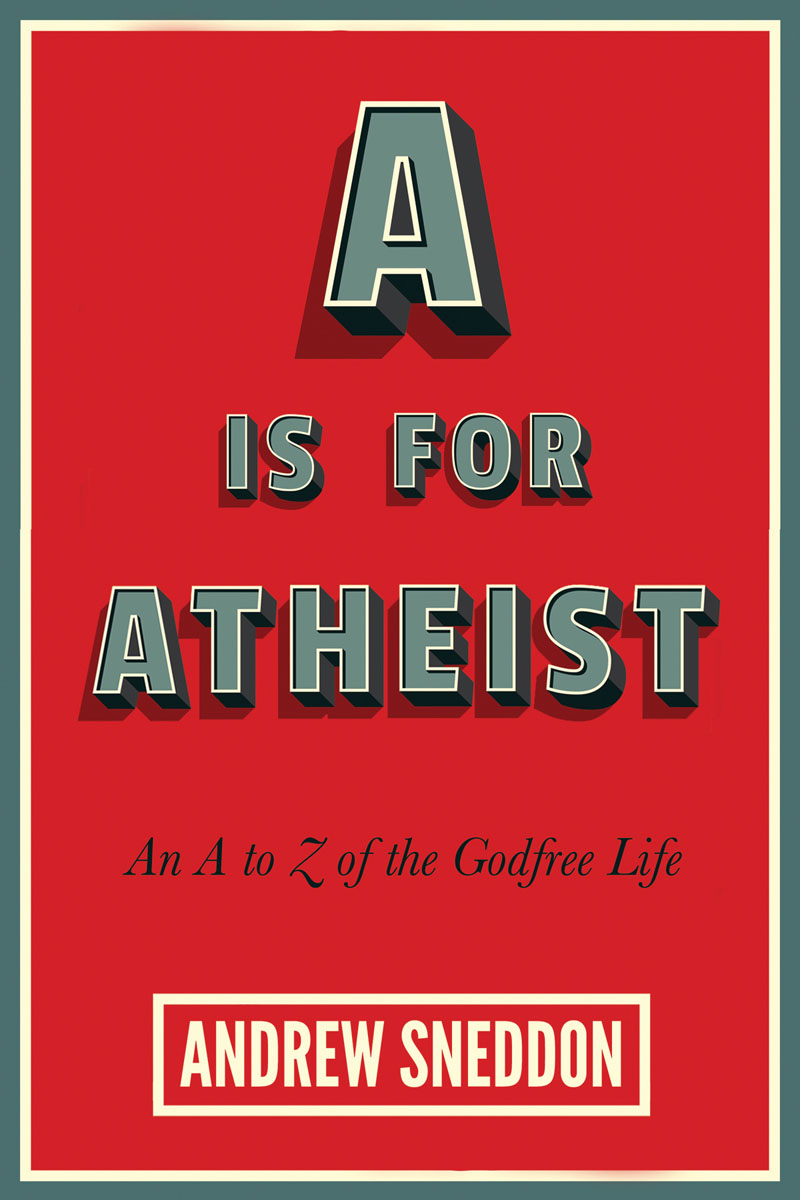

Pitchstone Publishing
Durham, North Carolina
www.pitchstonepublishing.com
Copyright 2016 by Andrew Sneddon
Library of Congress Cataloging-in-Publication Data
Names: Sneddon, Andrew, 1971- author.
Title: A is for atheist : an A to Z of the Godfree life / Andrew Sneddon.
Description: Durham, North Carolina : Pitchstone Publishing, 2016. | Includes bibliographical references.
Identifiers: LCCN 2015050303 (print) | LCCN 2016000094 (ebook) | ISBN 9781634310697 (pbk. : alk. paper) | ISBN 9781634310703 (epub) | ISBN 9781634310710 (pdf) | ISBN 9781634310727 (mobi)
Subjects: LCSH: AtheismDictionaries.
Classification: LCC BL2747 .S647 2016 (print) | LCC BL2747 (ebook) | DDC 211/.803dc23
LC record available at http://lccn.loc.gov/2015050303
Contents

Introduction

Once upon a time I believed in god. I grew up in a family that went to church fairly regularly. Less regularly I went to Sunday school. As a teenager I was particularly earnest about religion, as teenagers can be. I once gave a presentation in French class about my faith. The other students clapped, which was unusual. I remember discussing religion with other students. Most of us just took it for granted, but it was clear that there was an appeal to belief that was born of more than lazy habit. Religion seemed to raise and answer important questions. Where do we come from? Why are we here? How should we live our lives? Religions famously address these topics. My friends and I recognized this.
This does not mean that religious life made us comfortable. It didnt make me comfortable. It scared me, injecting uneasiness into what should have been a straightforward middle-class life. For one thing there was the weirdness of it all. A three in one god? Desert miracles thousands of years ago, then silence? Mysterious plans that would justify the arbitrary cruelty found in the world and in biblical stories? All very strange. For another there were the distasteful things that were asked of me. The religion in which I grew up was not terribly oppressive, but it clearly did not treat women as equals to men. Should I really accept this? I had no appetite for spreading the word, despite my belief. Tithing was obviously a scam; my belief wasnt so blinding that I couldnt see that.
Worst of all was hell. Or rather, worst of all was the idea of eternal punishment, along with a rather complicated body of ideas that accompanied this idea. Eternal suffering is one thing. Eternal suffering as punishment for failing to live up to religious demandsfor sinning, in shortis another. Being threatened with such torment for the sins of my ancestors is an even bitterer pill to swallow. And some sins have to do with mere belief, not with action. Regardless of what you did, you could end up in hell for thinking the wrong way! I found the overall picture of my life as a high stakes yet baffling test deeply disturbing.
Now my life is better. In no small part it is better because I have given up on religious belief. Some of the old questions remain, but not many. The real concerns that my teen self faced have been transformed by a better understanding of the kind of thing I am and the kind of world I live in. My life is not a test, and neither is yours. Realizing this can be quite a comfort.
If that were all there was to becoming an atheist, there would be no need to write this book. But thats not the end of the story. Religious belief is very common, to such an extent that those who reject it are suspect, even despised. Once in a while a religious spokesperson, such as a pope, says something like this:
Openness to God makes us open towards our brothers and sisters and towards an understanding of life as a joyful task to be accomplished in a spirit of solidarity. On the other hand, ideological rejection of God and an atheism of indifference, oblivious to the Creator and at risk of becoming equally oblivious to human values, constitute some of the chief obstacles to development today. A humanism which excludes God is an inhuman humanism. (his italics)
Pope Benedict XVI, Caritas in veritate, encyclical, June 29, 2009
As criticism of atheism goes, this could be worse. Still, its pretty pointed: atheists are insensitive to values. Atheists offer an inhuman form of life. The message is that atheism should be resisted. If Benedict were correct about atheism, the reason to reject it wouldnt be peculiar to Catholics. It would pertain to anyone who worries about genuine values and wants to reject inhuman doctrines. Yikes!
This used to make me angry. Words like these are an insult to the many good people who are not attracted by religion but who are upstanding members of their communities. Whatever inhuman might mean, these people arent it. They are humane, kind, compassionate, the very sort of humans we want as neighbors.
Why would the pope, of all people, smear these people in this way?
However, I have now reconsidered my anger. After all, consider the life of a pope. These people are brought up in thoroughly religious contexts. They never meet nonbelievers in any sustained way. They are taught doctrines and immersed in traditions that urge rejection of atheism in ways ranging from mild to murderous. Given a life like this, what should we expect popes to say about atheism? Everything they knoweverything!gives them reason to be concerned about it. They dont know any better.
Popes, of course, are not alone in this. Most people grow up in ways thoroughly permeated by religious ideas, including distrust of nonbelief. They dont know which of their neighbors are atheists. We have no marks, no defining habits, for all that unites us, essentially, is an absence. In short, lots of people are ignorant of what its like to be an atheist.
This book is an attempt to shed some light on this for the curious. Atheism has a bad reputation that it does not deserve. Much of this is fueled by misunderstanding. I aim to rectify this with understanding, or at least the first steps toward it.
If I am correct about the understanding of atheism among the religious, then one thing should immediately be clear: we should not trust what the religious say about atheists and atheism. Its not because they are ill-willed; generally they arent. It is because they literally do not know what they are talking about. They dont know atheists and have not studied atheism, so they are in the dark. Authority here falls first and foremost to atheists.
The same danger lurks with regard to what atheists have to say about religion. Fair enough. But there is a general difference between believers and nonbelievers here. The vast majority of atheists were not brought up as atheists. Some were, but most were not. Instead, they were brought up in a religious context. They know religion from the inside. This is my situation, and it is very common. And even those atheists who received their nonbelief as infants at their mothers knees were brought up in a society that is shot through with religious ideas. How do I know this? Because, so far as I can tell, this is all societies. Even modern secular states are populated by people who go to church, understand religious traditions, and, crucially, think about things using religious ideas.
You dont have to take my word for this. The people at the Pew Research Center study religion and ideas about religion, among other things. They did a study about knowledge of religion across certain groups in the United States: atheists, Jews, Muslims, various sorts of Christians, and so on. Atheists scored the highest of all. Nonbelievers know more about religion, typically, than believers. (See the results for yourself: http://www.pewforum.org/2010/09/28/u-s-religious-knowledge-survey-who-knows-what-about-religion.)
Next page
